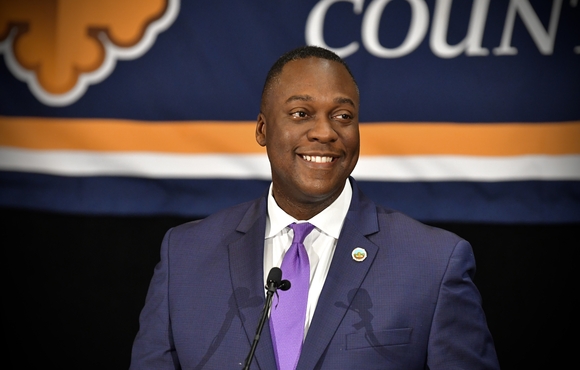ELLICOTT CITY, MD – Howard County Executive Calvin Ball was elected as the Maryland Association of Counties (MACo) President at the Annual meeting and Board Installation of the MACo Winter Conference. As President, Ball will help promote opportunities for elected officials of all levels across the state of Maryland. He is the first MACo President from Howard County since 2011 and the 6th Howard County President. Pictures from his installation can be found here.
Our local and regional partnerships have proven to be more critical than ever on the road to recovery from the pandemic and MACo has been an integral part of bipartisan organizing on behalf of all Maryland counties. I’m honored to be elected as MACo President, and I look forward to working with the incoming Moore/Miller Administration and my colleagues across the great state of Maryland to foster the best quality of life and further the mission of MACo for all Marylanders. I want to congratulate all the newly elected board members and thank outgoing President Laura Everngam-Price for her leadership over the last year.
In 2012, Ball founded the Maryland County Officials Diversity Caucus, a MACo Chapter Organization, and the first statewide caucus for county elected officials of color and those interested in issues central to diversity. This Caucus empowers and responds to issues affecting the most vulnerable communities and constituencies by advocating for legislation and policies beneficial to the people they represent. When the caucus began, fewer than 25 percent of county officials were people of color. Lt. Governor-elect Aruna Miller, who is the first immigrant Lt. Governor in Maryland history, provided a keynote address during the Winter Conference, building the progress of the vital caucus.
I congratulate my good friend, Howard County Executive Calvin Ball, on being sworn in as MACo President. I’m confident that his talent for bringing people together will shine through in this role, which will help us all thrive and ensure we leave no one behind.
The MACo Board of Directors is made up of 16 county elected officials. These county leaders are selected by the MACo membership to serve the interests of the Association, oversee its management and strategic direction, and maintain and develop relationships with other parties with whom MACo and counties regularly interact. The Board works collaboratively with the MACo Legislative Committee, which sets policy positions for the Association and directs its legislative advocacy priorities.
“Howard County Executive Ball is perfectly situated to lead counties through the upcoming year of so much change,” said Michael Sanderson, Executive Director, MACo. “He has the experience, insight, and ability to build collaboration and bring everyone together so that counties can deliver on the issues important to us all.”
Ball has been on the Executive Board for four consecutive years, previously serving as 1st Vice President in 2022, and will serve in a one-year term alongside fellow Officers:
- John Olszewski, Jr., Baltimore County – 1st Vice President
- Jack Wilson, Queen Anne’s County – 2nd Vice President
- MC Keegan-Ayer, Frederick County – Secretary
- Lenny Pfeffer, Dorchester County – Treasurer
- Sharon Green Middleton, Baltimore City – Past President
Previous MACo Presidents from Howard County include former County Executive Ken Ulman (2011), former Senator Jim Robey (2006), former Councilmember Dr. C. Vernon Gray (1992), former County Executive J. Hugh Nichols (1986), and former Councilmember Charles E. Miller (1972).
About the Maryland Association of Counties (MACo):
MACo is the non-profit, non-partisan voice of all 24 Maryland counties, promoting effective, efficient government through advocacy, education, and collaboration. The Association’s membership consists of county elected officials and representatives from Maryland’s 23 counties and Baltimore City. MACo’s members determine Association policy and positions on executive and legislative proposals through an elected Board of Directors and a Legislative Committee. Through MACo’s advocacy, training, educational programs, and annual conferences, members are provided with endless opportunities to improve their capacity to serve their residents.
